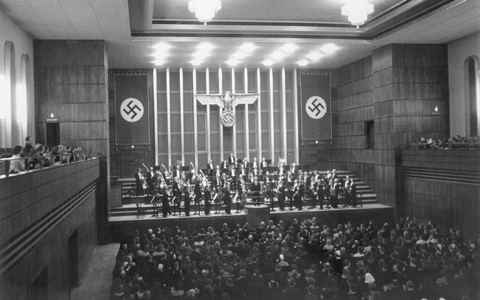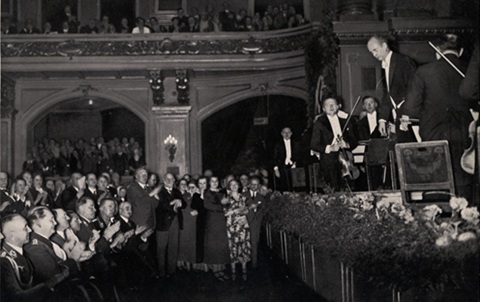
The extent of German musicians' and actors' complicity in the Nazi persecution of Jewish people is exposed in new research by the University of Southampton.
From 1933 - when Hitler and the Nazi party came to power - onwards, Jewish orchestral musicians were dismissed, and Jewish concertgoers were gradually banned from attending performances.
Professor of Modern European History Neil Gregor's research has also found evidence of German orchestras acquiring instruments stolen from deported Jews, and a German theatre ensemble performing for the SS inside the Auschwitz concentration camp.
After the war, many musicians claimed that the field had been innocent. Concert halls were represented as having been places to retreat from the violence of the Nazi regime.
In fact, they became places in which the nationalism and racism of the Nazi regime were just as profoundly present as in the rest of society.

Professor Gregor said: "Through this research, I was stunned to find out how fast so many people in the music world fell behind the new regime in 1933. I have never been under the illusion that orchestras and concert halls were places of retreat from the regime's politics, but I was shocked to find out how close cultural institutions were to the genocide."
Professor Gregor uncovered evidence - in the form of extensive organisational correspondence - that members of the Silesian State Theatre in Breslau (today Wrocław, Poland) visited Auschwitz to entertain the SS.
He said: "They would have witnessed and known about what was happening inside the camp. Discovering this complicity was horrifying."
He also found evidence suggesting that instruments probably stolen from Jewish victims of the Holocaust found their way to German orchestras.
"There is evidence of the Propaganda Ministry writing to one of Germany's top orchestras in 1941, as deportations of Jews were getting going, and offering it two top violins - a Stradivarius and a Guarneri - for a cheap price, as a gift from Hitler," explained Professor Gregor. "It is not hard to work out where they most likely came from."
Professor Gregor has created a Spotify playlist featuring performances of symphonies from the era, including performances by Munich Symphony Orchestra, Hamburg State Theatre Orchestra and Berlin Philharmonic Orchestra.
"The recordings, I hope, provide a starting point for imaginative immersion into the world I have sought to bring to life," he said.
The research is published in a new book, The Symphony Concert in Nazi Germany .






